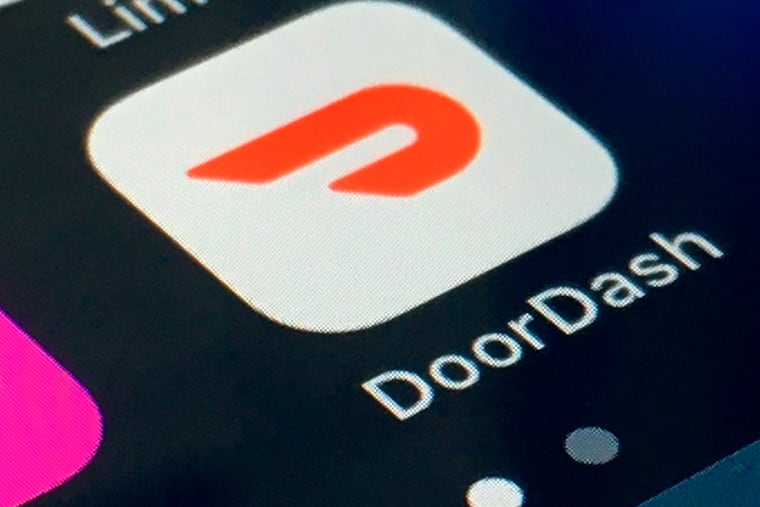DoorDash is accused of ‘thwarting’ Philadelphia’s cap on food-delivery fees
DoorDash, the food-delivery giant, rolled back many restaurants' commission plans. Some restaurateurs now may be paying more, and customers eventually may see higher menu prices.

DoorDash, the largest third-party restaurant delivery service operating in Philadelphia, is accused of skirting the city’s rules instituted during the pandemic that cap commissions at 15%.
Some restaurateurs now may be paying more to DoorDash, and customers eventually may see higher menu prices.
In late June, DoorDash notified its Philadelphia restaurant partners by email that their agreements with the company would be automatically restored to what they had before the pandemic. In some cases, these plans — which include wider delivery areas and more visibility on the platform — can be twice as expensive.
Any merchants that were previously contracted at the basic 15% did not have their rate changed. The owners can restore the 15% plans at any time by notifying DoorDash, a spokesperson said.
Some restaurateurs contacted by The Inquirer said they were told that if they kept the basic plan, their delivery area would shrink and their customers’ delivery charges would increase, effective July 26.
But not everyone said they saw the notices of June 28 and July 24.
Dean Kitagawa, who owns Wood Street Pizza at 12th and Wood Streets, said he learned of DoorDash’s move late last week from Ben Fileccia, senior vice president for strategy and engagement at the Pennsylvania Restaurant & Lodging Association, which lobbied for the cap in 2020. “I get so many dang emails from them a day, so I don’t necessarily drill down into those so much,” Kitagawa said.
“The reality is that most restaurants won’t receive this email because the recipient may believe it’s another promotional email, the email lands in a spam folder, or most likely, the email is delivered to an employee who may no longer be employed with the restaurant,” said Fileccia, calling DoorDash’s opt-out process unfair. “We also fear that many small, independent, and minority-owned businesses are simply not aware of this law or DoorDash’s incorrect interpretation and will be forced to pay higher commission rates instead of using the revenue to create better experiences for their staff and guests.”
Fileccia said he had not heard similar complaints about other delivery companies, although one pizzeria owner in Northern Liberties said he was negotiating a better plan not only with DoorDash but with Grubhub. The pizzeria owner asked that his name not be used because he feared reprisals during talks with the companies. He said restaurateurs can get relief through negotiation.
A DoorDash spokesperson said that the company was in compliance with the city law and that it reached out to all Philadelphia merchants “multiple times” to inform them of changes to their commission. “We know every restaurant is different, so we want to make sure they know the options available for local restaurants and that they can change their plan at any time,” the spokesperson said.
Delivery commissions and the law in Philadelphia
In 2020, as the pandemic drove patrons and restaurants to delivery and takeout, restaurants began complaining about commissions charged by companies such as DoorDash, Grubhub, and UberEats. In some cases, restaurants were paying 25% or 30% for delivery and marketing — positioned as necessary expenditures in a digital dining world with keen competition.
In mid-2020, Philadelphia joined a list of cities capping fees. Philadelphia capped them at 15% — 10% for delivery and 5% for marketing — in a bill sponsored by then-City Councilmember Cherelle L. Parker, now the Democratic nominee for mayor.
Last year, when the city made the cap permanent, the law was modified to allow delivery companies to also offer pricier enhanced services, such as wider delivery areas and better marketing that puts ads in front of more potential customers.
DoorDash’s website says it serves at least 2,500 food businesses in Philadelphia. The company, based in San Francisco, reported an annual net loss in 2022 of $1.3 billion on sales of $6.58 billion.
‘Not following the guidelines’
DoorDash’s recent move has piqued the interest of the city. “It does appear that they are not following the guidelines,” said Anna Breece, director of policy and strategic initiatives for the city Commerce Department. She said the department would attempt “additional engagement” with DoorDash.
Fileccia said DoorDash was “thwarting” the law by penalizing those that keep the 15% basic plan. Under the rules, delivery services may not penalize anyone for opting into a lower tier of service.
Kitagawa, of Wood Street Pizza, said he learned that DoorDash was restoring his old plan, which calls for a 20% commission.
DoorDash told Kitagawa that if he changed his rate back to the 15% basic plan, his customers’ delivery fee would increase while his delivery radius would decrease, “which means fewer customers can order from your store.”
By rolling back to 15%, his pizzeria also no longer would be enrolled in DashPass, a subscription service that DoorDash told him accounts for 54% of the shop’s DoorDash sales.
“I’m waffling back and forth on whether to go with [the 20%],” Kitagawa said. He enjoys his wide delivery area, which at certain times extends to the Main Line.
If Kitagawa goes with the more expensive plan, he said, he would raise his menu prices to help offset the higher fee. “I already increased them to offset the 15%,” he said.
Fileccia urged restaurateurs to check current and past statements from all third-party delivery companies and to contact him at ben@prla.org or to the city’s Office of Business Services at business@phila.gov or 215-683-2100.